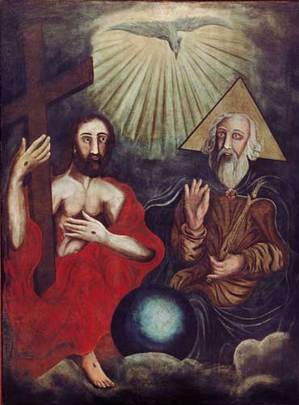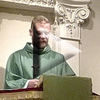A sermon reflecting my attempt to navigate the treacherous waters of the doctrine in the Christian Church used to describe God that we refer to as Holy Trinity.
I suggest you listen to the sermon in the link below, but feel free to browse the text notes that are added for your convenience.
Sermon delivered at St. James Lutheran Church of San Leandro
May 31, 2015 - Holy Trinity Sunday
"Deep Doctrine" - Lectionary text from Romans 8:12-25 & John 3:1-17
Greetings my sisters and brothers, saints and sinners, children of God.
We Christians are used to gathering on Sundays to get together to be in relationship with God, to worship God, to ask God for guidance, help and strength, and to carry God out into the world with us. But it is the very nature of that wondrous gift of faith that God gives us to believe in God without actually knowing what God is, and it is in the very nature of humanity to be intimately curious and want to understand God, to explore God and try to define God.
Now, if you're like me, who had somewhat of a typical Lutheran upbringing...in my case, a South Carolina LCA congregation...my most basic understanding of God as parent, or God as father if you want to get perfectly honest with those times was also with God as creator, who made the universe and humans in God's own image, and who loves the creation and who, like a mother or father who wants the best for their children, even if it means loving us despite the worst of our behavior. And this is God at God's most basic, Yahweh god that we inherited from our Jewish forebears.

During the Easter season we get to explore our uniquely Christian understanding of god the Son, and learn about how this Jesus Christ who was begotten by God with Mary, who became fully human and who would suffer and die out of that great love for us and be raised up again to ascend into heaven. And who is became our advocate with God the Mother/Father and who knows and understands us deep in those parts of our soul that we barely understand.
And last week, on Pentecost Sunday, we had an opportunity to focused on God the Holy Spirit, who we experience in the gathering and who God sends into our lives and we encounter day by day. The Spirit who is God's breath and who gives us life and makes miracles happen and who fills us with wonder and joy and empowers us to have this gift of faith that God's grace has bestowed upon us.
But one Sunday out of the year, we get to celebrate the and maybe even try to explain unexplainable nature of God, the Holy Trinity, our triune God. This is a feast day and is the only Sunday of the year that we are focused on a doctrine of the church, and as such, we can find ourselves wondering just how are we going to wrap our heads around this concept of God as three-in-one.
And it seems entirely appropriate we do this with a passage from John in which some poor sod wants to engage Jesus in some other understanding of God's relationship with humanity.
And to be honest, Nicodemus is not entering into this conversation with Jesus fully informed. To begin with, he has to show up at night and brings with him all of his own preconceptions. Now there is nothing bad about Nicodemus, and no matter what we can speculate about his motives, whether or not we think he's been sent to Jesus to get a read on him or on his own accord out of an unbridled curiosity, it is fairly certain that he's entering into this conversation with a desire to seek more. And we can't really blame him for not understanding. Jesus himself seems to have endless patience with him as he responds to each of Nicodemus's questions...How can we be born again? How can these things be?
Nicodemus is doing what a lot of us do when we think we already know what someone is talking about ahead of time. He knows that Jesus is at the very least a man of God, but he's dealt with rabbis before and so he's very limited in scope as to what the conversation is going to be about. His abject literalism is blocking him from seeing the deeper truths that are being repeated back to him, truths that have such a power to change the very nature of his life and the lives of each and everyone in the world.
Nicodemus wants a little guidebook to life and Jesus is talking about how to achieve ultimate freedom. That rebirth comes not from the body but from a transformation that is so great, in water and spirit, so deep, so lasting that no little guidebook will help him find his way. The wind blows where it will and so it is with the Spirit. And we have no control over that, no matter what we do or say, our life is in God's hands. We find our comfort in accepting that. But is it enough?
Now every Wednesday I am one of the outside volunteers who goes into the San Quentin state prison and participates in the bible study in the Catholic Chapel. Prisoners are very interesting to do bible study with, because many of them have spent a lot of time with very little to do but read, and the most available thing to read for them is the Holy Bible. So when working with prisoners you often have men and women who know more about bible passages than even the most dedicated of pastors. Add that to the sometimes awful programming on television that comes out about scripture and you have some very interesting and bizarre conversation.
But when it comes to questions of doctrine, like the Holy Trinity, we often have a much more vast and different conversation. This past week, in anticipation of Holy Trinity Sunday, we studied the lectionary and this question was asked: To which of the three persons in the Trinity do you most relate to? Do you pray to Abba, God, the Father, or Mother as your relationship with God works. Do you speak to Jesus, the Son, the Begotten One, is it Christ's voice that answers you when you hear what God has to say? Is it the Spirit that is the first one that comes to mind, the breath of God, the wind of God, Ruach, pneuma, God as living action and behavior in the world? Or do you somehow relate to all three, in the indescribable, ineffable Holy Trinity, as our doctrine presents.
The answers varied among the volunteers as much as it did among the prisoners. Because for questions such as these, there are rarely easy answers. Some related to God the Father, and some to the Son. And while many Christians are apprehensive about talking about the third person, the Holy Spirit, some of the men were not apprehensive about saying that the spirit was the one who they related to most.
Because our relationships with God are rarely cut and dry. Theology itself is not a square with right angles. There's always a third angle to consider, another perspective to look at. It's more than a failed algebra equation of one plus one plus one merely equaling one; because that is just a way of watering down the majesty of what God is.
There is really nothing we can do to to explain exactly how the trinity works, and it's hard to say why this is our doctrinal understanding of God. I had a fellow alumna friend of mine post on Facebook a memes about preaching on the holy Trinity, and it suggested rather than facing a potential heresy of trying to explain it to people it would be better to simply hold up a photo of a kitten.
But Paul, in the Romans text, rather than explaining the trinity in doctrinal terms, at the very least points us in a direction in which we can understand how it works for the Christian in her or his daily life.
Christ calls God "Abba," which is not so much translated as Father but a much more affectionate term, like "Dad," or "Pops." I'm not even certain those words do the word "Abba" justice, because there is a deep, intimate relationship between Christ and God the Father that cannot be translated by such words.
But by virtue of in Christ's suffering, death, and resurrection by way of the cross we have been given this incredible gift, that we ourselves have been adopted into that relationship with the one God, that just as Jesus was heir to God that we may also be children of God, adopted via that same love that Jesus shows us. That God has for us, his beloved creation.
And it is by virtue of that love for us that the Holy Spirit has lead us into that relationship that Christ makes available. That the Spirit leads us and guides us daily to live out our lives in the manner that Christ taught us, that we become witnesses to his glory in the world living out his commandment that we love one another, being good to each other, kind, helping our neighbor whether they be friend or stranger, living in communion with one another, not letting things hang between us. The Spirit empowers us to do that.
So no amount of theological education can give me the means to explain how one God works as Abba, Christ, and Spirit, I can only offer up my limited and comfortable view on how I talk to Abba God sometimes Father, sometimes Mother, who through Christ, works in my life by means of God the Spirit. But it could just as easily be Christ I am talking to, or the Spirit, when I lift my hands up and pray, because God works as God works, as Spirit, Son or heavenly Creator, or any other name or means God manifests God's power in the world.
We know that God loves us. And that God wants us to be the best children we can be. And that through God's ineffable trinitarian nature, God has saved us to draw us--God's adopted children --close, and be in the divine loving presence with God, sanctified and made whole, in the kingdom without end. And that, my sisters and brothers, is some very good news. Amen.


